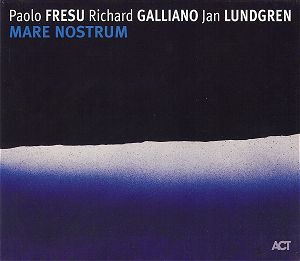Mare Nostrum (Lundgren) [5:55]
Principessa (Galliano) [4:35]
Eu Nao Existo Sem Voce (A.C.Jobim, V. de Morales)
[2:58]
The Seagull (Lundgren) [3:18]
Que reste-t-il de nos amours? (Trenet) [4:32]
Years Ahead (Lundgren) [5:05]
Sonia’s Nightmare (Fresu) [4:04]
Chat Pitre (Galliano) [3:00]
Valzer del Ritorno (Fresu) [4:24]
Open Your Mind (Lundgren) [4:05]
Liberty Waltz (Galliano) [4:10]
Mio Mehmet, forse il destino m’impedirà
di riverderti (Fresu) [4:29]
Ma Mère L’Oye (Ravel, arr. Galliano)
[4:28]
Para Jobim (Galliano) [3:57]
Vårvindar Friska (trad., arr. Lundgren)
Paolo Fresu (trumpet, fluugelhorn)
Richard Galliano (accordion, bandoneon)
Jan Lundgren (piano)
rec. 7-11 January, 2007, Artesuono studios,
Cavalicco (Udine), Italy.
This is a quite delightful,
idiosyncratic trio recording. A glance at
the instrumentation will be enough to tell
you that there are instrumental textures and
combinations here that lie well outside the
jazz mainstream. Has there, indeed, ever been
a previous recording made by this particular
combination of instruments?
But the oddity (uniqueness?)
of the instrumental combination matters far
less than the self-evident fact that – at
least when played by these three very talented
musicians – it works.
The booklet notes by René
Hess offer hints as to how the meeting of
a Sardinian trumpeter, a French accordionist
of Italian descent and a Swedish pianist might
have come about. Apparently Lundgren and Galliano
first encountered one another on-stage in
a jam session at a Japanese festival, and
each was very taken by the other’s work. We
are told that an unnamed drummer (could it
have been Alex Riel or Morten Lund?) who worked
regularly with both Lundgren and Fresu may
have served as a medium of contact between
the two. However this trio came about, let’s
be grateful that it did.
Playing a mixture of originals
and standards (not that all of them are all
that ‘standard’), Fresu-Galliano-Lundgren
produce some beautifully sensitive and thoughtful
music; the absence of drums and bass allows
a particular freedom of interplay and results
in some beautifully transparent passages.
This is intimately conversational music, imbued
with an absolute sense of dialogue. All three
members of this ad-hoc trio are, of course,
substantial names already, ‘stars’ if one
will. But they all seem to have no difficulty
in submerging their egos to a genuinely group
personality and coherence. Fresu’s familiarity
with the idioms of Miles Davis and Chet Baker
is grounded in, and personalised by, his familiarity
with the music of his native Sardinia; Galliano
– without ever being merely derivative – is
equally at home in the traditions of the French
accordion and the music of Astor Piazzola;
Lundgren’s musical language certainly encompasses
important dimensions of the modern jazz piano
tradition, but much in his work also echoes
Swedish folksong and some aspects of the classical
tradition. All three, in short, are instinctively
eclectic musicians – and, as such, well-suited
to this kind of open ended (and open-eared)
cross-cultural dialogue.
The music is quite and reflective,
but possessed of a genuine emotional charge,
even if it works by under- (rather than over)
statement. Graceful, but never merely predictable,
never willing to settle for the merely obvious,
this has about it that ‘sound of surprise’
Whitney Balliett thought of as the essence
of jazz (even if these particular sounds might
not have seemed to Balliett to constitute
‘jazz’). Fresu’s tone is gorgeous and warm,
Lundgren’s lines are lucid and Galliano’s
playing is constantly inventive both rhythmically
and harmonically.
A small gem.
Glyn Pursglove
